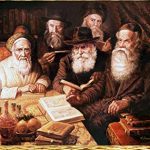Meat, poultry & Wine during the Nine Days Eating meat and poultry Drinking wine
Shabbos Erev Tishe Beav
Shabbos Erev Tishe Beav 1. Menu:[1] Even when Tishe Beav falls on Shabbos there are no restrictions towards the Shabbos menu and one may eat meat, fish and wine as much as his heart desires, and may feast to the point that was done on the table of Shlomo Hamelech. […]
Women or sick Fasting on Tishe Beav
Fasting: It is forbidden for an adult man or woman to eat or drink anything on Tisha B’av, with exception to the cases brought below. Sick: One who is sick:[1] A person who is sick and needs to eat, is not required to fast on Tisha B’av.[2] If he […]
Havdalah on wine
Havdalah:[1] When saying Havdalah during the nine days [Motzei Shabbos Chazon] one is to give the wine to drink to a child [whether male or female[2], although some rule only male[3]] which has reached the age of Chinuch [of blessings[4] although some say also Chinuch of Havdalah[5]] but has not […]
Freshly laundered clothing
Wearing freshly laundered clothing:[1] Wearing freshly laundered clothing is forbidden during the nine days. The above applies to any clothing, even if it is not worn on the body, such as towels, tablecloth, or linens for a bed. [Nevertheless those clothing that become overly dirty and sweaty, such as all […]
Tasting meat Erev Shabbos
May one taste a meat dish on Erev Shabbos?[1] One may taste a meat dish to see if it requires any extra spices. However it is forbidden to eat it even in order to fulfill the custom of eating the Shabbos food before Shabbos. Giving children meat on Erev […]
A Cappella Music
May one listen to A cappella music? The widespread custom even amongst G-d fearing Jews is to permit listening to A cappella[1] music.[2] However there are Poskim[3] that are stringent to prohibit listening to music even of such nature. [1] Music that is not accompanied by instruments of any […]
Peruzbal
Summary of the laws of Shemitas Kesafim and a Peruzbal The laws: The Torah commands us that at the end of the seventh year cycle one must annul all loans that he is owed by other Jews. It is thus forbidden for the lender to ask for the loan to […]
Selichos 2
Shabbos Mevarchim Tishrei:[1] No blessing before Musaf:[2] On the Shabbos before Rosh Hashanah we do not bless the coming month despite this being the custom on every Shabbos that precedes Rosh Chodesh.[3] Tehillim:[4] The entire book of Tehillim is recited before Shacharis just as on any other Shabbos Mevarchim. Av […]
Blowing of the Shofar 5
Not to talk of irrelevant matters until after Musaf:[1] One must beware not to talk of irrelevant matters between the Tekios Meyushav [which is the first set of blows that is sounded after Kerias Hatorah] and the Tekios Meumad [which is the second set of blows in Musaf].[2] One is […]


